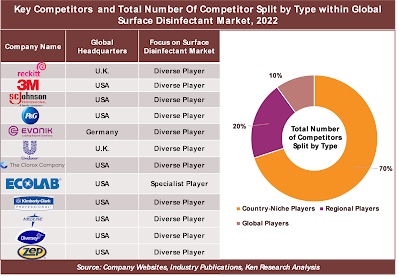Few Diverse Global Players Dominate the Market Holding ~40% of Revenue Share Despite Presence of about ~250 Competitors Comprising a Large Number of Country-Niche Players and Some Specialist Players, finds a recent market study on Global Polyurethane Market by Ken Research.
Plastic substance polyurethane comes in a variety of shapes and sizes. It is the material of choice for a wide range of end-user applications and may be modified to be either rigid or flexible. Polyurethanes are adaptable, contemporary, and secure. They are employed in a wide range of processes to produce a wide range of consumer and industrial goods that are essential in making our lives more practical, cozy, and ecologically friendly. Ken Research shares 3 key insights on the competitive landscape of this dynamic market from its latest research study.
1. Global Players that Constitute Just 10% of Total Number of Competitors Hold Largest Revenue Share of 40% While Regional Companies Also Have A Strong Presence and Hold 30%
A comprehensive competitive analysis conducted during the Research Study found that the Global Polyurethane Market is highly competitive with ~250 players which include globally diversified players, regional players as well as a large number of country-niche players. The large global players comprise about 10% in terms of the number of companies and hold ~40% of the market revenue share followed by regional players which account for ~30% of the market revenue. Most of the country-niche players are foam and raw material suppliers. Some of these who successfully evolve to create application-specific solutions often get acquired by large global players seeking to grow and diversify quickly.
2. Leading Specialist Global Players' Ongoing Efforts To Provide Range Polyurethane Foams To Multiple End User Industries are Driving Revenue Growth of this Market
Detailed comparative analysis of key competitors available within the Research Study shows that specialist companies, such as Foamcraft Inc, and Laxness are highly focused on providing a significant number of polyurethane products that can be used across multiple industries, including furniture, building and construction, and more.
3. A Temporary Halt in Manufacturing Activities Caused By The Prolonged COVID-19 Hindered The Global Production Of Raw Materials.
Government restrictions on travel, lockdowns, and factory closures caused by the COVID-19 pandemic affected the polyurethane industry. The building and construction sector’s stagnancy harmed the polyurethane market. Storage apparatuses, such as specific refrigerators, where COVID-19 vaccine vials can be kept, are prepared using rigid polyurethane foams. These are deployed in the global shipment of vaccines.
Due to the COVID-19 pandemic, there was a temporary halt in manufacturing activity that hampered the production of raw materials around the world. It affected both the market and other concurrent activities in the end-user segment. Several raw material orders, including those for MDI, TDI, polyols, and isocyanates, were delayed or canceled, resulting in production bottlenecks.
However, the building and construction industry, along with the furniture market, is in a recovery mode, putting the Polyurethane market back on the growth trajectory.
Increased Government Initiatives And Policy To Support The Growth Of The Global Polyurethane Market
The use of methylene chloride at foam production processes is forbidden by the final National Emission Standards for Hazardous Air Pollutants (NESHAP). Local manufacturers of flexible polyurethane foam Cut or glue pieces of flexible polyurethane foam extension of the Time for Public Comment the planned RTR's public comment period has been extended until March 29, 2021. These components are then employed in upholstered products including furniture, automobiles, some appliances, and other products, either together or to other substrates.
The phase-down of HFCs for low GWP blowing agents has the complete backing of the American Chemistry Council (ACC). In accordance with the AIM Act, the Center for the Polyurethanes Industry (CPI) petitioned the EPA in May to gradually reduce the usage of HFCs in the polyurethane industry. With effect from January 1, 2023, the petition asks the EPA to reinstate the limitations on HFCs from the Significant New Alternatives Policy initiative.
For more information on the research report, refer to the below link:-
Contact Us:-
Ken Research
Ankur Gupta, Head Marketing & Communications
Support@kenresearch.com
+91-9015378249






















